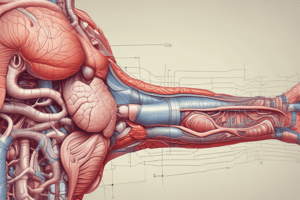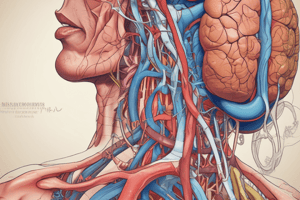Podcast
Questions and Answers
Which protein synthesized by the liver plays a crucial role in maintaining oncotic pressure?
Which protein synthesized by the liver plays a crucial role in maintaining oncotic pressure?
- Immunoglobulins
- Hemoglobin
- Insulin
- Albumin (correct)
Which structure is primarily responsible for supplying most of the liver's blood?
Which structure is primarily responsible for supplying most of the liver's blood?
- Inferior vena cava
- Renal artery
- Hepatic portal vein (correct)
- Hepatic artery
Which of the following substances is mainly detoxified by the liver to form urea?
Which of the following substances is mainly detoxified by the liver to form urea?
- Bilirubin
- Ammonia (correct)
- Creatinine
- Lactate
Which clinical manifestation is a hallmark of chronic hepatitis?
Which clinical manifestation is a hallmark of chronic hepatitis?
What class of medication is commonly prescribed for managing chronic hepatitis B?
What class of medication is commonly prescribed for managing chronic hepatitis B?
Which hepatitis viruses can be prevented through vaccination in Canada?
Which hepatitis viruses can be prevented through vaccination in Canada?
In which type of cirrhosis is hepatic fat accumulation typically seen?
In which type of cirrhosis is hepatic fat accumulation typically seen?
What is the most common clinical manifestation associated with portal hypertension?
What is the most common clinical manifestation associated with portal hypertension?
What is a key management strategy in the care of patients with cirrhosis?
What is a key management strategy in the care of patients with cirrhosis?
Which cranial nerve is responsible for the pupillary constriction reflex?
Which cranial nerve is responsible for the pupillary constriction reflex?
What type of brain injury is most likely to cause widespread damage to the brain's white matter and particularly affects axons?
What type of brain injury is most likely to cause widespread damage to the brain's white matter and particularly affects axons?
What is the earliest indicator of increased intracranial pressure (ICP)?
What is the earliest indicator of increased intracranial pressure (ICP)?
Which ocular change is considered an emergency and indicates potential brain herniation?
Which ocular change is considered an emergency and indicates potential brain herniation?
In assessing a patient using the Glasgow Coma Scale (GCS), what score would a patient receive who opens their eyes only in response to pain, makes incomprehensible sounds, and withdraws from pain?
In assessing a patient using the Glasgow Coma Scale (GCS), what score would a patient receive who opens their eyes only in response to pain, makes incomprehensible sounds, and withdraws from pain?
What is the primary effect of increased levels of carbon dioxide (CO2) on cerebral blood vessels?
What is the primary effect of increased levels of carbon dioxide (CO2) on cerebral blood vessels?
A patient with a head injury who experiences a period of lucidity followed by a rapid decline in consciousness is indicative of which type of hematoma?
A patient with a head injury who experiences a period of lucidity followed by a rapid decline in consciousness is indicative of which type of hematoma?
Which symptom is most likely to be observed in a patient with post concussion syndrome (PCS)?
Which symptom is most likely to be observed in a patient with post concussion syndrome (PCS)?
What type of weakness would a nurse expect to find in a patient who has experienced a transient ischemic attack (TIA)?
What type of weakness would a nurse expect to find in a patient who has experienced a transient ischemic attack (TIA)?
Which statement by a patient prescribed Clopidogrel (Plavix) indicates a need for further teaching regarding its purpose?
Which statement by a patient prescribed Clopidogrel (Plavix) indicates a need for further teaching regarding its purpose?
What is a likely nursing assessment finding in a patient with right-brain damage after a stroke?
What is a likely nursing assessment finding in a patient with right-brain damage after a stroke?
Where is the antrum of the stomach located?
Where is the antrum of the stomach located?
Where is bile released during digestion?
Where is bile released during digestion?
What is the name of the sphincter that separates the esophagus from the stomach?
What is the name of the sphincter that separates the esophagus from the stomach?
The most common site for peptic ulcers is?
The most common site for peptic ulcers is?
What is the most common complication of peptic ulcer disease (PUD)?
What is the most common complication of peptic ulcer disease (PUD)?
GERD is primarily a result of what condition?
GERD is primarily a result of what condition?
What is the most common cause of duodenal ulcers?
What is the most common cause of duodenal ulcers?
What would the nurse expect to note in a client with cholelithiasis and a gallstone lodged in the common bile duct?
What would the nurse expect to note in a client with cholelithiasis and a gallstone lodged in the common bile duct?
Which of the following best describes Murphy's sign?
Which of the following best describes Murphy's sign?
Which laboratory test is most specific for diagnosing acute pancreatitis?
Which laboratory test is most specific for diagnosing acute pancreatitis?
Flashcards are hidden until you start studying
Study Notes
Gastrointestinal System
- The antrum of the stomach is located near the pylorus.
- Bile is released in the duodenum during digestion.
- The lower esophageal sphincter separates the esophagus from the stomach.
- The duodenum is the most common site for peptic ulcers.
- Hemorrhage is the most common complication of peptic ulcer disease (PUD).
- Gastroesophageal reflux disease (GERD) is primarily caused by low pressure in the lower esophageal sphincter.
- Management for GERD should include eating small, frequent meals and remaining upright after eating.
- H. pylori is the most common cause of duodenal ulcers.
- In cholelithiasis, a gallstone in the common bile duct may cause yellow sclerae.
- Murphy's sign is characterized by pain on deep palpation causing breathing to stop.
- Mid-epigastric pain that radiates to the back is a common symptom of acute pancreatitis.
- Serum lipase is the most specific laboratory test for diagnosing acute pancreatitis.
- Abdominal ultrasound is the preferred initial imaging for suspected acute pancreatitis.
Hepatic System
- Albumin is primarily synthesized by the liver.
- The hepatic portal vein provides most of the liver's blood supply.
- The liver primarily detoxifies ammonia by converting it to urea.
- Palmar erythema is a characteristic manifestation of chronic hepatitis.
- Nucleoside analogs are commonly used in the treatment of chronic hepatitis B.
- Vaccination is available for Hepatitis A, B, and D in Canada.
- Alcoholic cirrhosis is associated with hepatic fat accumulation.
- The most common manifestation of portal hypertension is esophageal bleeding.
- Managing cirrhosis includes using diuretics and sodium restriction to address ascites.
Neurological System
- Cranial nerve III is responsible for pupil constriction.
- The pia mater is the innermost layer of the meninges, closely adhering to the brain's surface.
- Increased levels of CO2 result in vasodilation of cerebral blood vessels.
- A change in level of consciousness is the earliest indicator of increased intracranial pressure (ICP).
- A fixed, dilated pupil indicates potential brain herniation and is an emergency sign of increased ICP.
- A patient with a GCS score of 8 requires intubation; this is calculated from responses to eye opening, verbal, and pain stimuli.
- Common symptoms of post-concussion syndrome include persistent headaches and sensitivity to light and noise.
- An epidural hematoma is indicated by a period of lucidity followed by rapid decline in consciousness after head injury.
- Diffuse axonal injury (DAI) is characterized by widespread damage to the brain's white matter, particularly axons.
- Unilateral weakness is a typical symptom of a transient ischemic attack (TIA).
- Right-brain damage post-stroke often leads to impulsive behavior and impaired speech.
Studying That Suits You
Use AI to generate personalized quizzes and flashcards to suit your learning preferences.




